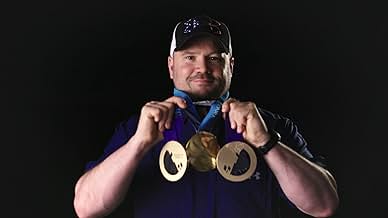AVALIAÇÃO DA IMDb
7,2/10
937
SUA AVALIAÇÃO
Adicionar um enredo no seu idiomaA look at the mental health challenges Olympic athletes often face.A look at the mental health challenges Olympic athletes often face.A look at the mental health challenges Olympic athletes often face.
- Direção
- Roteiristas
- Elenco e equipe completos
- Produção, bilheteria e muito mais no IMDbPro
Avaliações em destaque
This may be the dooropener that every athlete in the world that every athlete should have or should have had in their years of active sporting. its a documentary on mental health issues in the top level of executing sports on top level, or olympian level, or as the layman journalist often say'' the proffesionals'' in sporting, and how life turns out when stepping down or retirement from the sport is a fact.
and the fact is that many people really hits headless into a brick wall when everyday life begins. ive been doing swimming, on a pretty tough level nationally with 22-30 hours of practice pr week, and i was far from talented and not birthgiven the genes and bodytype to become a great swimmer, but i did do it. when i quit swimming due to studies and work to make a living i didnt become depressed, but i lost a lot of friends, and became extremely introvert and more and more isolated due to that, loosing confidence, and as time went by i became more frustrated and despaired than depressed.
my conclusion have, as years have passed by, is that athletes, especially athletes on top level in individual sports are extremely nerdy, maybe the nerdiest of all humankind, and to be nerdy is often caused by some kind of latent mental health issues. im an old grumpy man today, married with children and grandchildren, none doing sports, actually they hate the thought of competing(maybe from their mothers side). but these day when children are detected by the environment of kindergarden and schools showing signs of , and /or being diagnosed with mental health issues, i have concluded and have been supported by school mates and sports friends in later years that i must've been an ad/hd'er and extreme OCD'er when growing up, keeping my symptoms under cotrol by practicing till fatigue made me sleep, and my life was completely automatized into wake up,eat train,school, eat, train, homework ,eat and sleep in a neverending clockwork of never letting the guards down. so imagine was i the only one being like that??
i guess serious athletes do have a loose screw inside ones temples, and should really be taken cared of and asked by their coaches and surroundings, how do you do today, every day as long as sports are the only thing that matters in life. mental readyness for later life experiences can be better managed if talked over during the active years.
its a good and comprehensive documentary, that actually couldve been even better if based on more factual findings, but the stories told by phelps and others are gutwrenching, and almost had me crying when viewing.so R.I.P to those who couldnt manage life anymore, and take care to all the rest of the worlds retiree's thats still alive and kicking. its a big grumpy recommend.
and the fact is that many people really hits headless into a brick wall when everyday life begins. ive been doing swimming, on a pretty tough level nationally with 22-30 hours of practice pr week, and i was far from talented and not birthgiven the genes and bodytype to become a great swimmer, but i did do it. when i quit swimming due to studies and work to make a living i didnt become depressed, but i lost a lot of friends, and became extremely introvert and more and more isolated due to that, loosing confidence, and as time went by i became more frustrated and despaired than depressed.
my conclusion have, as years have passed by, is that athletes, especially athletes on top level in individual sports are extremely nerdy, maybe the nerdiest of all humankind, and to be nerdy is often caused by some kind of latent mental health issues. im an old grumpy man today, married with children and grandchildren, none doing sports, actually they hate the thought of competing(maybe from their mothers side). but these day when children are detected by the environment of kindergarden and schools showing signs of , and /or being diagnosed with mental health issues, i have concluded and have been supported by school mates and sports friends in later years that i must've been an ad/hd'er and extreme OCD'er when growing up, keeping my symptoms under cotrol by practicing till fatigue made me sleep, and my life was completely automatized into wake up,eat train,school, eat, train, homework ,eat and sleep in a neverending clockwork of never letting the guards down. so imagine was i the only one being like that??
i guess serious athletes do have a loose screw inside ones temples, and should really be taken cared of and asked by their coaches and surroundings, how do you do today, every day as long as sports are the only thing that matters in life. mental readyness for later life experiences can be better managed if talked over during the active years.
its a good and comprehensive documentary, that actually couldve been even better if based on more factual findings, but the stories told by phelps and others are gutwrenching, and almost had me crying when viewing.so R.I.P to those who couldnt manage life anymore, and take care to all the rest of the worlds retiree's thats still alive and kicking. its a big grumpy recommend.
It is clear that Phelps was roped in to headline this because of his name & status. As a swimming enthusiast myself, and having followed the lives & progress of swimmers of the London & Rio Olympics, I thought Allison Schmitt's depression story should have been included. It would make a very compelling tell.
The athletes interviews were uneven imho. Some were diplomatic. Lolo Jones' segments gave me the deepest impression. Her accounts were raw, eye-opening and had you wanting more.
It's clear we have some issues with our Olympic athletes and their mental health, this documentary clearly shows that. I wish we had seen if this was a global issue and also have there been changes made to help our USA athletes? There seems to be some but it wasn't clearly addressed in the documentary.
It's not exclusive to Olympic caliber athletes- any successful athlete-be it football, baseball, basketball, bowling, etc., to get to a level of top tier performances, when the end comes, you're left with a whole lot of nothing.
For that matter, top level scientists, researchers, academics, etc., to get to that level, you have to be singularly focused on a goal that consumes you whole.
The higher you climb in your particular field, the farther you find yourself plummeting when the end of that particular road ceases to exist. The key to success in most cases is to develop interests and friendships outside your area of expertise, away from those people and things that are hanging around solely due to your successes. The hard part is, finding those things and people because the person is so focused on the outcome they're not realizing how vital those things are until it's too late.
We are in desperate need of mental health care for all, not just olympians. We have homeless vets living on the streets facing the exact same crises of the mind that these Olympians face-the inevitability that what was your entire life is now over and coping with everyday life is an impediment.
For that matter, top level scientists, researchers, academics, etc., to get to that level, you have to be singularly focused on a goal that consumes you whole.
The higher you climb in your particular field, the farther you find yourself plummeting when the end of that particular road ceases to exist. The key to success in most cases is to develop interests and friendships outside your area of expertise, away from those people and things that are hanging around solely due to your successes. The hard part is, finding those things and people because the person is so focused on the outcome they're not realizing how vital those things are until it's too late.
We are in desperate need of mental health care for all, not just olympians. We have homeless vets living on the streets facing the exact same crises of the mind that these Olympians face-the inevitability that what was your entire life is now over and coping with everyday life is an impediment.
Good documentary for those who don't know the sacrifices Olympic athletes make. However, what should be mentioned, is the rampant use of performance enhancing drugs (including steroids) by Olympic athletes. After the Olympics, many athletes cycle off, and this is a very dangerous time, leading to depression and dark thoughts. Seems this documentary aims to spotlight the massive sacrifices Olympians make, and mentioning rampant steroid abuse would somehow tarnish their image. Yet, one should look at rampant steroid abuse as yet another example of the many sacrifices they make -- both when it comes to mental health and also to physical health.
Principais escolhas
Faça login para avaliar e ver a lista de recomendações personalizadas
- How long is The Weight of Gold?Fornecido pela Alexa
Detalhes
- Data de lançamento
- País de origem
- Central de atendimento oficial
- Idioma
- Também conhecido como
- The Weight of Gold
- Empresa de produção
- Consulte mais créditos da empresa na IMDbPro
- Tempo de duração1 hora
- Cor
Contribua para esta página
Sugerir uma alteração ou adicionar conteúdo ausente

Principal brecha
By what name was O Peso do Ouro (2020) officially released in India in English?
Responda













